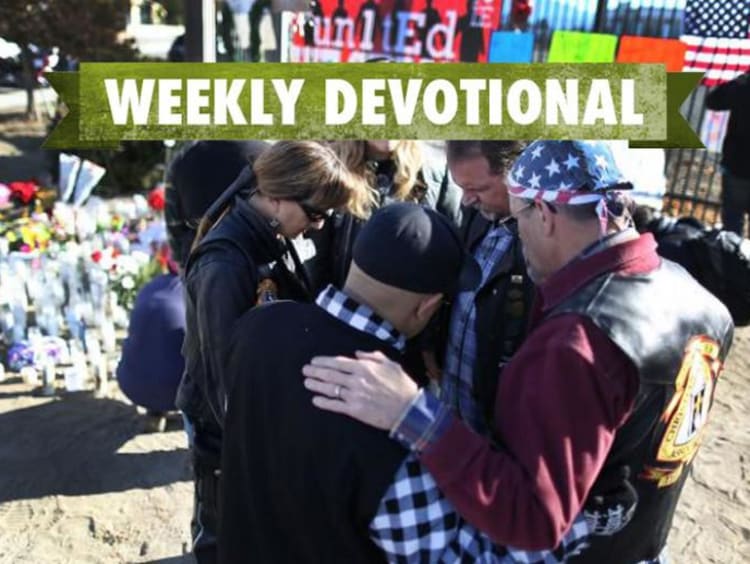Weekly Devotional: Redemptive Violence – Part 2
By Chris Cunningham
Local Outreach Coordinator

“ ‘Put your sword back in its place,’ Jesus said to him, ‘for all who draw the sword will die by the sword.’ ” (Matthew 26:52)
Live By the Sword
A few weeks ago, my Twitter feed was again overrun with news about another mass shooting. I watched on with a nauseating feeling of déjà vu as police chased the shooters, Syed Rizwan Farook and his wife Tashfeen Malik. Syed and Tashfeen were the first husband-and-wife shooter team in recent record; their chase ultimately ended in a shootout with police. Both died in the incident.
According to public record there have been more mass shootings in America than there have been days in 2015. If you’re anything like me, hearing this type of news can feel… a bit like trying to bottle a tornado.
How do you cognitively process that type of information? As a nation, what should our response be to such ongoing devastation?
Change gun control laws?
Hire more police?
Harshen jail sentences?
The alarming frequency at which so many human lives are being cut short through the barrel of a gun demands a response. Again, if you and I are similar in any way, you probably struggle to identify how you feel about this issue and how to communicate those feelings.
So, instead of trying to provide a solution (Lord knows that’s way beyond my capability anyway), I want to revisit a topic I addressed in my last post.
Creation stories.
The first act of any story is typically laced with clues about the story’s basic trajectory. In the average film, we learn everything we need to know about the protagonist and the type of journey he or she will be going on within the first 10 to 15 minutes of a film.
Open up the Bible and you’ll see this same format in the book of Genesis. Spoiler: Read the first five chapters of Genesis and you’ll have the raw elements necessary to understand the basic plotline of the entire Bible.
Interestingly enough, the “law of the first act” can be applied to human history as well.
Ancient myth tells the story of brothers Romulus and Remus, who fought to the death over a plot of land near the Tiber River. After killing his brother, the humble Romulus claimed the land as his prize, calling it Rome, after his own name. So, Rome was birthed through the murder of a brother.
With this kind of origin myth, we shouldn’t be surprised to read about the coals of war that fueled Rome’s engine. We also shouldn’t be surprised to learn about the causes of Rome’s fall. Historians recognize a set of problems that acted like tumbling dominoes, leading to the crippling of Rome. Invasions, economic crisis, over expansion, civil wars and government corruption eventually took their toll on the Roman Empire.
Romulus and Remus may have never even existed, but their story foreshadowed the eventual crumbling of Rome. When a nation’s overarching narrative begins with the degradation of human life, it shouldn’t come as a shock that this same nation meets its end just as violently.
Which brings us to America. My home.
Is our nation’s creation story any different from the empires that came before us? I used to think so. Throughout high school and into my college years, I held naively to the notion that the founders of the U.S. happened upon North America by an act of providence, for the sake of the Gospel even.
History textbooks largely gloss over the horrors associated with the construction of modern America. However, if the law of the first act is true, we need only look at our nation’s current historical situation to see the truth.
America is Romulus.
Any other story would be a grave injustice. Not just for the public, but for the American Indians, African slaves, early settlers and all those who died on the altar of the American Dream.
Despite what some may say, I still believe America is a great country. Across the world, families and individuals risk their very lives at the chance to breathe the freedom that’s said to dance through our air.
But, the sobering truth is that greatness has never been an excuse for negligence. No nation can truly understand its place in history unless that nation is willing to examine the bodies it has climbed over to get there. Nations, as we all know, are made up of people, and every person holds within themselves the potential for great compassion or grotesque selfishness.
Great and grotesque. All of us.
In Jesus’ day, groups of zealous Jews sought to bring about the rule of God’s Kingdom by the hilt of a sword and the tip of a dagger. On the night of His arrest, one of Jesus’ followers, a zealot, rushed to Jesus’ side swinging a sword in a frantic attempt to end the injustice he saw taking place. Can violence ever be ended by violence? The other disciples looked on with that same nausea I got over San Bernardino. They knew what was happening.
But Jesus seemed to see past these scared human attempts to bring about peace. It’s from this vantage point that Jesus said, “Put down your weapon. Those who live by the sword, die by the sword.”
And so here we are, in the wake of mass shootings, rumors of war, terrorist plots and tear drops. Looking back on the empires that have risen and met their fall before us, has violence ever truly solved conflict? I can’t help but wonder how this all looks from God’s perspective. Humans unloading firearms, dropping bombs, organizing military efforts and engineering new ways to kill each other.
Maybe we’re all that scared zealot, waving our little daggers and guns at a problem that we’ve created with our own hands. Maybe the solution can only be seen by those who refuse to look at humanity through the scope of a rifle.
Grand Canyon University’s Department of Spiritual Life offers students a place to share their faith and helps integrate faith into the campus community. For more information, contact us today.
The views and opinions expressed in this article are those of the author’s and do not necessarily reflect the official policy or position of Grand Canyon University. Any sources cited were accurate as of the publish date.


